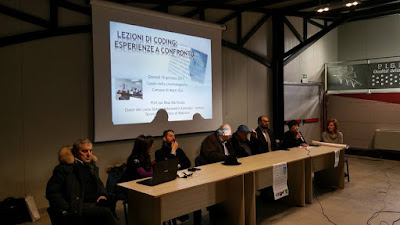Convegno a Marzi
Lezioni di coding: esperienze a confronto
Conference:
About the coding, comparing experiences lessons
Program:
H 9:30 - Welcome and start of work: Marzi Mayor arch. Rodolfo Aiello; Dr. Lucia Abiuso Pedagogical Coordinator National Plan of digital school (PNSD) - Office III - USR Calabria (she spoke of the importance of the proper use of technology and the development of computational thinking); Councillor for Culture of the Municipality of Rogliano Dr. Antonio Simarco; Ing. Aldo Trecroci Head teacher of Istituto Comprensivo of Rogliano; teacher Sergio Vizza IIS "Marconi-Guarasci" section. ITE Rogliano (Cs).
H 9:45 - Statement of the computer science teacher Rosa Marincola and of course Information Systems students Company Institute Economic Technical Rogliano.They have talked about the different experiences of coding made, of the computer competitions (Olympics Bebras and problem solving) and the importance of computer science at school for the development of lateral thinking and logic skills.
H 10:20 - Statement of the teachers Manuela Policicchio, Digital Animator, Professor Anna Conforti, a member of the digital IC team of Rogliano, and students. They described the challenges which was attended by the students and the successes achieved in competitions
H 11:00 - Lectio magistralis by Professor Francesco Calimeri, professor in the Course of Studies in Computer Science at the Department of Mathematics and Computer Science in the University of Calabria. He has exhibited in a simple and captivating language some of its central field of research time: Artificial Intelligence and the recent developments of this fascinating discipline in neural networks and robotics and for new jobs.
H 12:15 - Conclusions and final greetings.
Saturday, January 21 the I.C students have visited the IIS "Marconi Guarasci" and done laboratory experiments in particular have done coding in the 3D virtual world Edmondo assisted by students of IV A ITE SIA
 |
Articolo pubblicato su Cronache delle Calabrie del 31/01/2017Link all'articolo pubblicato su www.savutoweb.it |
 |
A surprise: the students show their holograms
|
 Presentation of teacher Rosa Marincola and her students
Computer science is the science of the representation,
storage, processing and transmission of information.
Computer education in schools has the following specifics:
This shows that the role of information technology in
primary and secondary education, such as mathematics, is twofold, both
practical training:
To briefly characterize the cultural contribution made by information relevant to the understanding of contemporary society, the computer scientist Jeannette Wing in 2006 introduced the term:
"Computational thinking"
Computational thinking is a mental process for the
resolution of problems formed by the combination of characteristic methods and
intellectual tools, both general value.
The characteristic methods include:
What is the hour of the code?
The Ministry of Education, in collaboration with the CINI -
National Inter-University Consortium for Information Technology, started the
project the Future program with the aim to provide schools with a set of simple
tools, fun and easily accessible to train students to basic concepts
information technology.
Based on experience of success in the US started in 2013
which saw the participation of about 40 million students and teachers around
the world, Italy is one of the first countries in the world to experience the
structural introduction of the concepts in schools Basic iT through the
programming (coding), using tools easy to use and that do not require advanced
skill in the use of the computer.
Previous collaborations with Dr. Francesco Calimeri (link video) and about coding:http://www.iismarconiguarasci.gov.it/la-scuola/intelligenza-artificiale-mondi-virtuali-e-ora-del-codice Articles about coding in edMondo
Marincola Rosa: “Lezioni di scripting in LSL a Scriptlandia” n. 18 Dicembre 2012 "MATEMATICAMENTE.IT MAGAZINE" reperibile in rete:
Attestato di merito per il concorso Euclide-scuola e pubblicazione dell’articolo sulla rivista Euclide Scuola http://www.euclide-scuola.org/
N.16: “Giochi, strategie e algoritmi” realizzato con la classe Classe III A Sistemi Informativi Aziendali a.s.2012-13
Marincola Rosa: “ Curve algebriche: gioielli virtuali” n. 8 Aprile 2013
Marincola Rosa: “Programmare giochi in 3D” n. 21 Gennaio 2014 "MATEMATICAMENTE.IT MAGAZINE" reperibile in rete:
Marincola Rosa: “Giochi di abilità in 3D: Mastermind e Othello” n. 22 Maggio 2014 "MATEMATICAMENTE.IT MAGAZINE" reperibile in rete:
Marincola Rosa: “Le spirali di Archimede in 2D e 3D” n. 23 Settembre 2014 "MATEMATICAMENTE.IT MAGAZINE" reperibile in rete:
Articles about coding with Scratch
Marincola Rosa: <<Un gioco d’incertezza: “Forse che sì, forse che no”>>, n. 20 Settembre 2013
Marincola Rosa:” Proposte per l’inclusione di studenti con BES: le equazioni di I e II grado con Scratch” n. 25 Ottobre 2015
"MATEMATICAMENTE.IT MAGAZINE" reperibile in rete:
|












Nessun commento:
Posta un commento
Nota. Solo i membri di questo blog possono postare un commento.